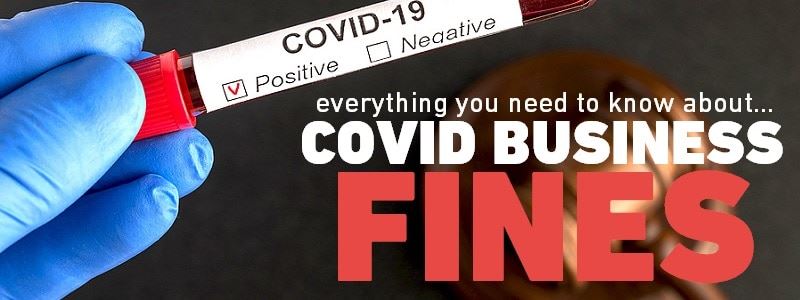Face masks. Hand sanitisers. Social distancing. COVID has brought a whirlwind of new regulations into the lives of business owners this past year, and it feels like things are never going to let up.
If you’re wondering what these adapting health and safety guidelines mean for your business, then look no further; we’re here to give you the lowdown on COVID business criminal law.
Is COVID Negligence a Criminal Act?
In short, yes. Duty of Care is a legal obligation and something that all business owners and employees must take seriously to avoid fines, closure or prosecution.
Section 33 of the Health and Safety at Work Act 1974 makes it a criminal offence for a business to breach their obligations to protect the wellbeing of their workers and the public. Since wellbeing is contextual to environmental circumstances, this includes risks associated with the recent pandemic outbreak.
Who is Liable in the Event of a Health & Safety Failure?
In essence, anyone and everyone is liable: employers, the self-employed, owners of premises used as a workplace, individual employees and anyone who causes another to breach safety legislation are all potentially criminally responsible.
A company, as a legal “person”, can also be prosecuted – in fact, much health and safety enforcement is focussed on organisations rather than individuals.
What Are the Costs of a COVID Fine?
The maximum fixed penalty under current regulations is £10,0000. Fines are issued on a sliding scale: £1000 first offence, £2000 second offence, £4000 third offence and £10000 for each subsequent offence.
In the summer of 2020, the Health and Safety Executive (HSE) received £14m extra funding for regulating and enforcing health and safety legislation. The Government introduced new requirements for certain businesses and gave Local Authorities the power to issue fixed penalties and prohibition notices for breaches.
The HSE are currently carrying out spot checks and inspections on all types of businesses in all areas to ensure they are COVID-secure.
Could Your Business Be Prosecuted?
A prosecution will occur if there is sufficient evidence to provide a realistic prospect of a conviction and if a prosecution is in the public interest.
Now, don’t shrug off COVID as non-evidential. While it can be difficult to identify the source of a COVID infection in any given incident, any business failure to assess COVID risks can be sufficient evidence to justify a prosecution.
How to Protect Your Business
The legislation is reasonable and doesn’t require businesses to completely eliminate the risk of COVID; instead, sufficient systems and processes must be in place to manage risks.
As long as clear, effective and documented procedures are regularly followed to protect people from harm, then you can rest easy knowing your business is meeting requirements.
COVID Safety Top Tips
We’ve compiled a list of necessary practices in line with HSE expectations to ensure your business is safe from negligence:
- Conduct and document a risk assessment – this is to identify your workplace’s needs, like a maximum capacity that must be adhered to
- Facilitate social distancing with an adapted layout, clear spatial markings and one-way systems
- Have sufficient hygiene provisions available to all, from hand cleaning stations to antibacterial cleaning supplies
- Enforce face coverings – ensure your staff adhere to the rules and make the rules clear for all visitors (offering these provisions in your workplace is a good idea if financially feasible)

